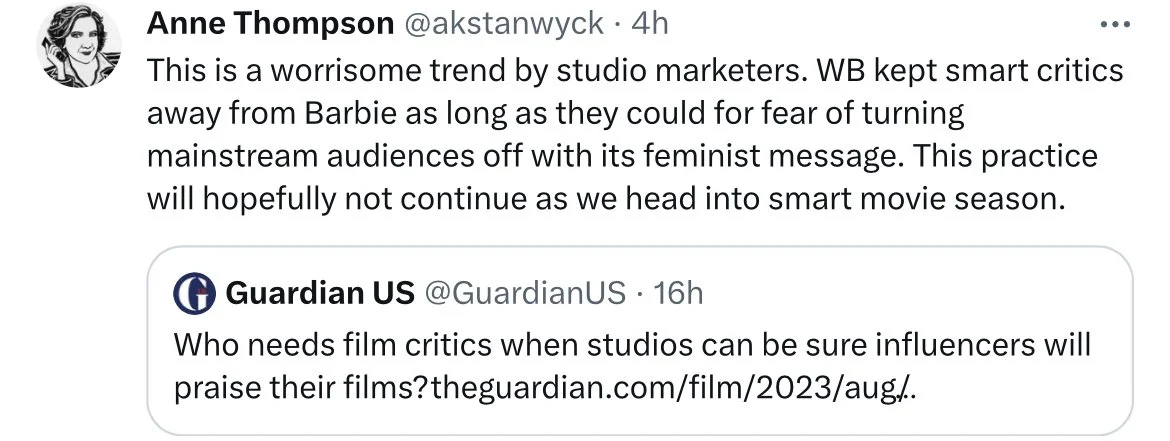A Guardian piece titled “Who needs film critics when studios can be sure influencers will praise their films?” is well worth a read.
In it, writer Manuela Lazic is raising the alarm over the growth of “influencers” at advanced screenings and how it could spell the demise of film criticism.
Now I’m fairly lucky that I can make a living by watching and writing about movies. I’m forever grateful for my readers, but it’s not peaches and roses for most film writers, outside of the trades and big media.
I remember 10 years ago, when I was a freelancer, being offered $10 a review by a decently established outlet. Hell, some other big-named outlets were asking me to work for free. Basically, to be a film critic in the 21st century is to be penniless.
Here’s Lazic tackling this …
If the internet has paved the way for the devaluation of cinema via streaming platforms, it has also done the same for film criticism. The democratising effect is undeniable, but so is the cheapening one, literally and figuratively. With so many more people writing about cinema online, fees for reviews have fallen to shockingly low levels and the expertise supposedly required of film critics has been forgotten – knowledge of the film history and good writing skills are less and less valued.
I’ve already tackled the “knowledge of film history” part of this. I can’t tell you how many film critics I’ve met who haven’t seen “Vertigo” and “Citizen Kane.” It’s truly mind-boggling. Chances are that some of the writers that you read have not seen a single Hitchcock or Welles.
However, what The Guardian piece zeroes in on are the “influencers”. On July 10, I wrote a piece titled “Barbie First Reactions Feature Zero Actual Critics.” The headline speaks for itself. Warner Bros started screening “Barbie” for “influencers, quote whores and people you’ve never heard of. That’s what Warner Bros wanted and they got it in flying colors.”
I asked, why is Warner Bros preventing critics from being the first ones to react to “Barbie”? Lazic expands on this topic by implying that it’s a marketing strategy that might be duplicated more and more in the months and years to come:
The fact that the audience at this preview screening consisted mostly of influencers was another blatant marketing strategy, which would not have been as insulting were it not for the fact that it meant many film critics were unable to see the film before its release.
She then tackled the debacle at Paris press screenings which, again, were populated by influencers and a “selective” amount of critics:
A few days before the film’s release, Parisian writers were dumbfounded to see some colleagues sharing glowing takes on the film on Twitter, after being told there would be no advance screenings for any of the press. Moreover, what were presented as exclusive interviews with the cast turned out to be prerecorded and pre-approved by the studio. Ahead of its release, the film was to be seen only through pink-tinted glasses.
This meant that the more high-brow critics over at "Libération", "Télérama", "So Film", and "Cahiers du Cinéma" did not get a chance to watch and review ”Barbie” until after the embargo lifted. Of course, Cahiers ended up panning, no, destroying, “Barbie” when they did get a chance to review it, but that’s besides the point.
This was all a pre-planned move from Warner Bros to try and control the narrative by organising advance screenings with an easy-to-please audience.
If all discussion of a film’s merits before release is left to influencers, whose driving ambition is to receive free merchandise by speaking well of the studio’s products, what can we expect the film landscape to look like? Where will engaging, challenging and, if not completely unbiased then at least impartial conversation about cinema take place, and how is the audience to think critically of what is being sold to it?
This doesn’t just speak to the brilliant marketing of “Barbie,” but also to the further disintegration of film criticism. Lazic is more or less implying that a majority of barely-payed film critics have also fallen into the trap, too scared to “ruffle feathers” and trying to avoid any “internet backlash” against unpopular opinions.
Instead [they] choose to generate bloated excitement for any new release. The studios are partly responsible, inundating young, broke writers with extravagant film merchandise that they otherwise could never afford and taking off their mailing lists those who review their films negatively.
This actually happened to me last year when I wrote a piece titled “The Cult of A24” and kept slamming EEAAO during awards season. All of a sudden, I wasn’t getting any more email invites from them. Luckily for me, I settled my score with the studio who, by the way, do consistently churn out strong indies every year. But I am allowed to dislike and write about how overpraised EEAAO was.
I’m glad Lazic has written this piece. There should be more of them. Honesty is something that’s sadly lacking these days in film writing.







